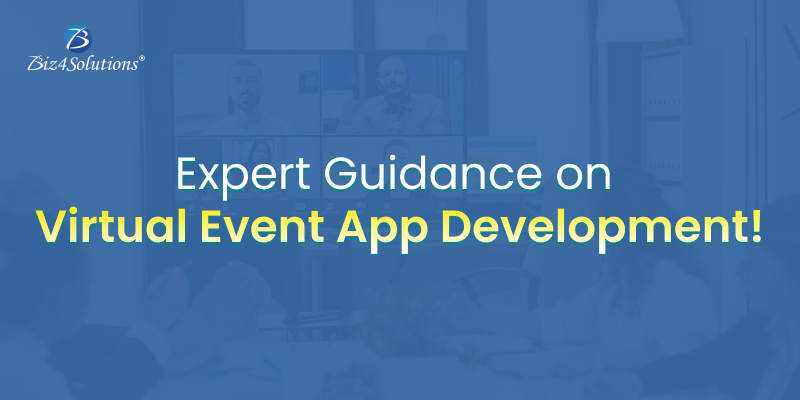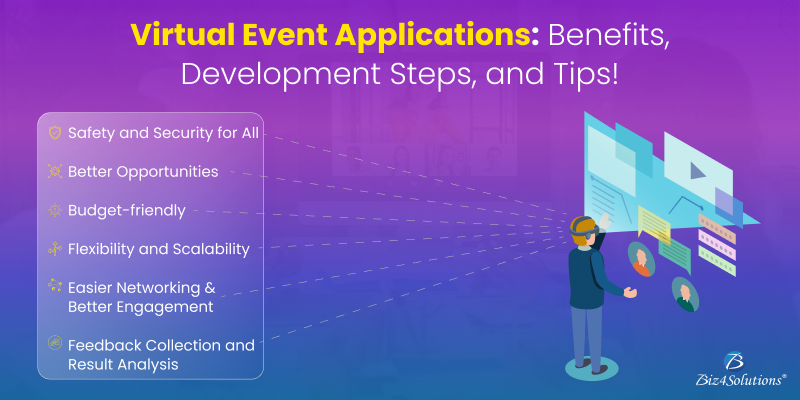
Virtual event software solutions entered the market long back, but their popularity reached its peak during the pandemic. During this phase, thousands of personal as well as corporate events got canceled or postponed, affecting numerous businesses. But then, virtual event applications came into the picture. Organizers conducted countless personal as well as corporate events through these apps. As such, several apps got outstanding attention, which was not even known to the masses, and their downloading spiked.
“Downloads of video conferencing applications were recorded to be 62 million, just in a single week of March 2020, after the pandemic,” as reported by TechCrunch, the renowned online newspaper for technology news. Since then, a plethora of virtual event software apps flooded the market and the face of the online conferencing and virtual event industry changed forever. Event-driven applications continued to be popular and this trend is here to stay.
This post throws light on the fundamental steps to creating a next-gen virtual event software solution. We have also spoken about the significant features of such apps and how they prove advantageous to diverse businesses. So, if you are planning to build a virtual event management app, this post answers all your questions.
Virtual Event Apps and Their Potential Advantages

What is a virtual event? Well, the events that one hosts online allowing the participants to participate or view the event from any corner of the world are called virtual events. These events can be webinars, virtual conferences, internal or external hybrid events, etc. Such digital events have some agenda and are usually expected to be collaborative sessions and are streamed online.
Such digital events are hosted using live-streaming platforms. Here, live streaming is an essential functionality of these apps. Zoom, Webex, Google Meet, Vimeo, Digitell, GoToMeeting, Intrado, Evia, etc. are a few examples of popular platforms and apps.
Take a look at the advantages of these applications!
Safety and Security for All
During the pandemic, online mobile event apps ensured the health and safety of the participants, event organizers, and all the involved staff. Without any need for in-person gatherings, the social distancing norms were maintained.
Better Opportunities
All the details like the number of tickets sold out for events, related email marketing reports, etc. are available on a single application. Besides, the participants can access the pre-recorded events, as per their will and availability. Also, they can chat with other users during live events to build business relationships. Such benefits offer extended opportunities to both app owners as well as participants.
Budget-friendly
Virtual events prove immensely cost-effective as compared to offline events. The event organizers only need to spend on the initial establishment cost. Once they develop a virtual event platform, hosting events become budget-friendly.
In offline events, the event planners have to consider a host of other costs like arranging for expensive equipment, booking a venue, etc. They also have to incur expenses like travel, accommodation, catering for participants. Thus, with virtual apps, the cost of events is drastically reduced. This approach is particularly advantageous for small-sized organizations, start-ups, and ones with budget constraints.
Flexibility and Scalability
Whether it is a simple sales kickoff meeting, a thought leadership meeting, or any event for that matter; all types of events can be flexibly hosted using these virtual platforms. Attendees from any part of the globe can attend virtual events or meetings at the same time without having to travel in person to the event venue. Besides, event organizers enjoy a lot of flexibility while planning events. They can speedily adjust event schedules and programming as per the need of the hour. This can really help organizers in situations when they come across unexpected changes or disruptions.
The virtual event organizer app approach also benefits individuals with mobility issues or other physical disabilities and find it challenging to attend an offline event. Furthermore, several apps provide the multi-lingual feature as well.
Easier Networking Better Engagement
Participants don’t have to personally visit a particular location to meet new people. Online chatting options make things much easier. Besides, they can conveniently collect details like the name, profiles, companies, etc. of other professionals in the meeting.
Virtual event platforms can offer multiple user engagement tools like QA sessions, live chats, surveys, polls, etc. These functionalities play a crucial role in providing engaging event experiences to attendees. They can interact with other attendees as well as the event content in a more meaningful way.
Feedback Collection and Result Analysis
Online event solutions generate valuable data on attendee behavior, engagement, and preferences. Mobile event apps can track data like the number of participants, the timing when they logged in, what amount they paid, and how, etc. This insightful data gathered are quite useful for result analysis.
Also, these apps allow the participants to provide feedback easily through polls or real-time sessions. Event-related data and attendee feedback help organizers and presenters evaluate the overall performance of the event and identify the areas of improvement. This will help them to make future improvements and tailor the content to accommodate the requirements and preferences of their targeted audience.
Top Features of Virtual Event Apps
- Event Registration
- Profile creation of the users
- Event page for details like event topic, date and time of the event, host details, etc.
- Speaker booths for multiple speakers to create their profiles and related details
- Facility to record live sessions and meetings
- Real-time chatting, one-to-one, and group chatting options
- Live video streaming option
- Payment options via PayPal, Google Pay, credit/debit cards, etc.
- Social media integration for sharing event-related data with other contacts
- Integrations like sales tools, email marketing, etc.
- Report generation and analysis
- Screen sharing
- Virtual hand raising
- Mute participants
- Audience polls
Steps To Architect a Virtual Event Application
Here are the crucial steps required for the creation of an online conference app:
Create the Architecture: Create an architecture that supports the requirements of your event management activities. Consider parameters like the kinds of interactions your app will support, the number of concurrent users, and the specific prerequisites related to data storage and retrieval. You can consider choosing a microservice architecture to facilitate modularity, maintainability, and scalability.
Development of Backend: In the initial development stages itself, build a server for running the application. It is always advisable to create the server from scratch rather than make use of any ready-made technologies.
Designing User Interface: UI marks the first impressions for your virtual conferencing application and hence, it is of utmost importance to thoughtfully design a captivating and intuitive UI.
Android and iOS Compatibility: If you want to reach a wider audience range, your event management mobile app must run on both- Android and iOS devices. For ensuring that your video streaming app supports Android, make use of WebRTC and for iOS, use Swift.
Important Factors to consider during Event App Development
Next, let us look into the three most important aspects you need to consider during the development of a virtual event app- cloud network, video architecture, and content management.
Cloud Network
The virtual conferencing applications come with an integrated data center infrastructure that is strictly supervised, tracked, and regularly modified by the development teams. This cloud network is created for providing global connectivity and for enabling users from all across the globe to connect and participate seamlessly. For example, Zoom has more than 15 data centers globally which are going to be expanding in the coming years.
Video Architecture
Now, the app architecture should be optimized to meet the video requirements for which, four important features must be considered, as given below:
Distributed architecture: This architecture enables the participants to share meetings across the network and allows them to easily join meetings via private communication using the nearest data center. Using a distributed architecture rather than a centralized approach will offer the required scalability to the app so that thousands of viewers can simultaneously get a consistent video experience.
Multimedia Routing: This approach offers the users with various streams of videos from other participants. It also reduces the need for computers’ power and thus, makes the app a greatly scalable system.
Video Encoding and Streaming: Your application should be able to encode and stream video content to attendees in real-time. Event app developers use video encoding techniques for compressing videos into suitable formats for streaming videos. The videos are then streamed to the attendees via the Internet. Usually, event apps use Cloud-based services like Microsoft Azure and Amazon Web Services for handling the activities of encoding and video streaming.
Multi-bitrate Encoding: Every single stream can be altered to several resolutions besides stream routing. Due to this, the need to decode, encode, and optimize the output is removed. This also allows the apps to provide video quality levels depending on the network capabilities and the system.
Service Application Layer: Higher quality of the service application layer ensures optimized audio, video, and screen-sharing for every device and the available bandwidth for offering the best network-wide experience.
Content Management
A virtual event organizing platform requires a content management system for managing the video content that the presenter will display during the event. So, organizers need to upload, organize, and schedule the content for various sessions and track the event. You may also have to integrate the application with third-party systems like registration and payment systems. This way, you can ensure that your attendees can access the content effortlessly.
Concluding Views
Virtual event planning apps help organizers plan and execute events in a more effective way with productive outcomes. At the same time, the attendees also go through a flexible and engaging event experience. However, creating an amazing virtual solution for hosting events is a complex process. You need to plan carefully and follow the correct execution steps. Hence, it’s important to pick the right event app development company and app development resources that are best suited to your use case development needs.



